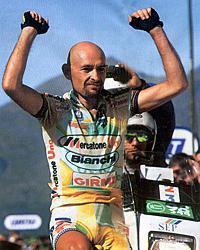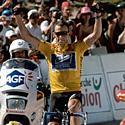
Recently on Cyclingnews.com |
91st Tour de France - July 3-25, 2004
Stage 13 - July 17: Lannemezan - Plateau de Beille, 205.5 km
Then and now: Vintage Pantani
The Pyrénées has hosted some magnificent battles in both the pre-WWII and modern era of cycling, and the inclusion of the stage finish to the Plateau de Beille six years ago set to continue that tradition. Anthony Tan looks at then and now on the road to the Plateau de Beille.

|
That year - the 1998 Tour de France - the race was set to follow the harder, anti-clockwise route; riders would begin the mountains with two stages in the Pyrénées before the shorter but generally steeper Alpine passes. The Pyrénées, therefore, would most likely decide not who would win the Tour, but who would lose.
Until this day to Plateau de Beille, defending champion and race favourite Jan Ullrich appeared to be in control. The day before, Giro d'Italia victor Marco Pantani attacked on the final climb of the Col de Peyresourde, but only managed to gain a measly 23 seconds from Ullrich, who did enough to reclaim the maillot jaune, Il Pirata still 4'41 behind the German by the day's end.
July 22, 1998: The second and final stage in the Pyrénées. Stage 11 was to cover a distance of some 170 kilometres and contained five significant climbs: the Cat. 1 Col de Menté, followed by three Cat. 2s - the Col du Portet d'Aspet, Col de la Core, and Col de Port - and then, after 154.3 kilometres (almost 40 kilometres of that being uphill), it was the hors categorie Plateau de Beille, a 15.7 kilometre climb with an average gradient of 7.6 percent.
After lousy weather the day before, riders opened their curtains to warm, sunny conditions. Swiss rider Roland Meier attacked on the day's third climb, the Cat. 2 Col de la Core, but at 5'32 behind the maillot jaune and considered no real threat to the overall, he was allowed some freedom.
The race slowly but surely became one of attrition; by the time the riders hit the lower slopes of the Plateau de Beille, a select group of no more than 20 riders remained. Ullrich, having suffered a puncture earlier on, was there, but by this stage alone, and with his mentor Bjarne Riis over three minutes behind, Pantani attacked as he only knew how: in the drops, and on the steepest part of the mountain. He was gone for good.

|
The powerhouse German rode bravely to limit his losses, eventually finishing in a six-man group containing Bobby Julich (who went on to finish third that year), Michael Boogerd and Fernando Escartin, but Il Pirata took more than a minute and a half out of his nearest rival and had shotgunned from eleventh to fourth on the general classification, now 3'01 behind Ullrich with the Alps still to come.
Pantani said afterwards: "My main goal in entering the Tour was to win this stage because it was the most beautiful climb in the race. Now I hope to win the other stage finishing in altitude, next week in Les Deux Alpes. As for overall victory, I think I lost too much energy in winning the Giro."
Well, he was right about one thing - he won the stage to Les Deux Alpes - but he also won the Tour!
Tragically, Pantani died from a cocaine overdose earlier this year on February 14, 2004, his frail character unable to withstand numerous doping allegations directed towards him that began after he was thrown out of the 1999 Giro d'Italia for an elevated haematocrit.
Four years later, it was Lance Armstrong's turn on the Plateau de Beille, where one day later and one day better, he inflicted a double dose of damage by taking his second consecutive stage win and a virtual stranglehold on the Tour. Beloki, Rumsas, Botero and Gonzalez de Galdeano may not have admitted it at the time, but deep down, they knew they were racing for second.

|
Stage 13 of the 2004 Tour de France bears a strong resemblance to the stage Armstrong won in 2002, which also began in Lannemezan and finished at the Plateau de Beille. This being the final day in the Pyrénées, and with overall honours still balanced on a knife's edge due to a rather uneventful first week and a half, aggression will be the order of the day. Expect to see the GC contenders going 'au-bloc' (flat out) in an effort to unseat Armstrong from winning a sixth consecutive Tour.
